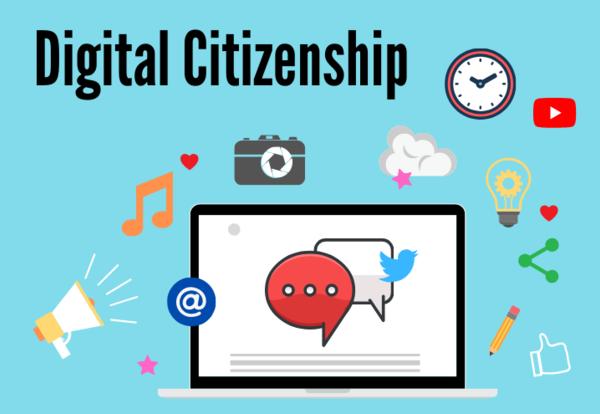In an era where digital interactions are as fundamental as face-to-face encounters, the concept of digital citizenship has emerged as a cornerstone of responsible participation in the online world. For today’s youth, who are truly digital natives, understanding and practicing good digital citizenship is not merely about avoiding pitfalls; it’s about empowering them to become young leaders who can navigate, contribute to, and shape the digital future ethically and effectively. This comprehensive approach moves beyond basic internet safety to encompass a broader understanding of rights, responsibilities, and the profound impact of their actions in the interconnected global arena.
The Imperative of Digital Fluency and Responsibility

For previous generations, the digital world was an addition to their existing reality; for today’s youth, it is an integral, often inseparable, part of it. They communicate, learn, socialize, and express themselves through digital channels. This deep immersion necessitates that digital citizenship be taught as a core life skill, just as important as traditional civics or literacy.
A. Defining Digital Citizenship
Digital citizenship extends far beyond simply knowing how to stay safe online. It’s a holistic framework encompassing multiple dimensions of responsible digital engagement.
- Digital Access: Ensuring equitable access to technology and the internet for all, recognizing that digital exclusion creates a significant barrier to participation in modern society. This includes understanding the digital divide and advocating for solutions.
- Digital Commerce: Comprehending the ethics and safety of buying and selling online, recognizing scams, and understanding financial literacy in a digital context (e.g., online banking, cryptocurrency, microtransactions).
- Digital Communication: Mastering effective, respectful, and appropriate communication across various digital platforms, understanding netiquette, and recognizing the nuances of online tone.
- Digital Literacy: The ability to find, evaluate, and effectively use digital information; critically assessing online sources, discerning misinformation, and understanding algorithmic influence.
- Digital Etiquette: Practicing polite and appropriate behavior in all online interactions, respecting others’ opinions, and understanding the impact of one’s digital footprint. This includes knowing when to engage and when to disengage.
- Digital Law: Understanding the legal implications of online actions, including copyright, plagiarism, cybercrime, and privacy laws.
- Digital Rights and Responsibilities: Recognizing fundamental rights in the digital space (e.g., privacy, freedom of speech) and understanding corresponding responsibilities (e.g., respecting others’ rights, protecting data).
- Digital Health and Wellness: Managing physical and psychological well-being in the digital world, addressing issues like screen time, digital eye strain, cyberbullying’s mental impact, and the importance of offline balance.
- Digital Security: Protecting personal data and devices from cyber threats, using strong passwords, recognizing phishing, and understanding basic cybersecurity practices.
B. Why Youth are Primed for Digital Leadership
Young people are not just passive recipients of digital education; their inherent traits make them ideal candidates to lead the charge in fostering better digital citizenship.
- Native Fluency: Having grown up immersed in technology, they possess an intuitive understanding of digital platforms, trends, and communication styles that older generations often lack. This familiarity makes them natural navigators and early adopters of new digital norms.
- Tech Savvy: They are quick learners when it comes to new apps, devices, and online functionalities. This technical aptitude allows them to grasp complex digital concepts faster.
- Desire for Impact: Many young people are deeply passionate about social justice, environmental issues, and community building. Digital platforms provide them with powerful tools to amplify their voice and drive change, aligning with their desire for meaningful impact.
- Global Perspective: The internet has exposed them to diverse cultures and global challenges from a young age, fostering a more inclusive and globally aware mindset, crucial for understanding digital citizenship in an interconnected world.
- Community Builders: They instinctively form and participate in online communities around shared interests, which can be leveraged to build positive digital spaces and advocate for collective good.
- Openness to Innovation: They are less bound by traditional ways of doing things and are often eager to experiment with new technologies and approaches to problem-solving, including in the realm of digital ethics.
The Transformative Power for Youth as Digital Catalysts
When equipped with robust digital citizenship skills, young people transcend mere participation to become active catalysts for positive change, shaping the digital world for the better.
A. Fostering Positive Online Communities
Youth are actively building and maintaining respectful, inclusive, and supportive online spaces.
- Peer Mentorship: Young digital citizens can serve as peer mentors, guiding friends and classmates on best practices for online safety, privacy management, and responsible communication. They often have more credibility with their peers than adults.
- Combating Cyberbullying: Empowered youth can be “upstanders” against cyberbullying, actively intervening, reporting incidents, and supporting victims, rather than being passive bystanders. They understand the nuances of online social dynamics.
- Promoting Inclusivity: By embracing diversity in their online interactions and challenging online hate speech, young leaders foster more welcoming and inclusive digital communities for all. They use their platforms to celebrate differences and promote acceptance.
- Netiquette Champions: They can lead by example in demonstrating respectful online communication, healthy debate, and constructive criticism, setting the standard for positive digital interactions.
B. Driving Social and Ethical Awareness
Young leaders are using their digital fluency to raise awareness about critical social issues and advocate for ethical technology use.
- Advocacy and Activism: Leveraging social media, they can quickly raise awareness for social justice, environmental causes, and human rights issues, mobilizing their peers and influencing public discourse (e.g., #FridaysForFuture, #BlackLivesMatter). They understand how to create viral content that drives attention to important causes.
- Critical Media Consumption: As digitally literate citizens, they can help identify and challenge misinformation, fake news, and algorithmic biases, promoting more informed public discourse among their generation.
- Privacy Advocates: Understanding their digital rights, young leaders can advocate for stronger data privacy regulations, call out companies with unethical data practices, and educate their peers on protecting personal information.
- Ethical AI Discussions: As AI becomes more prevalent, young leaders can initiate important conversations about AI ethics, algorithmic fairness, and the responsible development of intelligent technologies.
C. Innovating for Social Good
Equipped with digital skills and a civic conscience, young people are developing technological solutions to address real-world problems.
- App Development for Social Impact: They are creating mobile applications that address community needs, support mental health, promote sustainability, or facilitate civic engagement. Examples include apps for connecting volunteers, tracking local pollution, or simplifying access to community resources.
- Digital Storytelling for Advocacy: Using multimedia tools, they craft compelling digital narratives (videos, podcasts, interactive websites) to share personal stories, raise empathy, and advocate for marginalized voices.
- Community-Driven Tech Solutions: Engaging in hackathons or community projects, young leaders can prototype technological solutions for local challenges, often leveraging open-source tools and collaborative development.
- Web3 for Social Good (Emerging): Exploring the use of blockchain, NFTs, and DAOs for transparent philanthropy, decentralized aid, or community-governed social impact projects.
Challenges and Necessary Support

While the potential of young digital leaders is immense, the complex and rapidly evolving digital environment also presents significant challenges that require thoughtful strategies and continuous support.
A. The Persistent Digital Divide
Despite overall connectivity, unequal access to technology and skills remains a major barrier for many young people.
- Infrastructure Disparities: Many communities, particularly in rural or low-income areas, lack reliable high-speed internet access and affordable devices, hindering participation in digital learning and leadership opportunities.
- Socioeconomic Barriers: The cost of personal devices, internet subscriptions, and premium digital tools can exclude youth from disadvantaged backgrounds, exacerbating existing inequalities in digital literacy.
- Access to Quality Education: Not all schools or communities provide robust digital citizenship education, leaving some young people unprepared to navigate the complexities of online life.
B. Online Risks and Psychological Impact
Even for digitally fluent youth, the online world presents significant mental and emotional challenges.
- Cyberbullying and Harassment: Young leaders who are vocal online can become targets for intense cyberbullying, doxxing, or hate speech, leading to significant psychological distress, anxiety, and depression.
- Mental Health Strain: The pressure to maintain a perfect online persona, the constant comparison with others, the fear of missing out (FOMO), and exposure to negative or disturbing content can contribute to anxiety, depression, and burnout.
- Misinformation and Emotional Manipulation: Despite being digitally savvy, young people can still be vulnerable to sophisticated misinformation campaigns or emotionally manipulative content designed to exploit their idealism or vulnerabilities.
- Privacy Breaches and Digital Footprint Concerns: Young people often share extensive personal information online without fully grasping the long-term implications for their privacy, security, and future opportunities.
- Digital Overload and Addiction: The constant connectivity and engagement features of digital platforms can lead to excessive screen time, sleep disruption, and difficulty disconnecting, impacting physical and mental well-being.
C. Navigating Ethical and Legal Complexities
The rapidly evolving digital landscape often lacks clear ethical guidelines and legal frameworks, posing dilemmas for young leaders.
- Intellectual Property and Copyright: Understanding copyright laws and fair use when creating and sharing digital content can be complex.
- Data Ethics: Grappling with the ethical implications of data collection, algorithmic bias, and privacy in the apps and platforms they use or develop.
- Legal Consequences of Online Actions: Ignorance of digital laws (e.g., related to hate speech, defamation, cybercrime) can lead to unintentional legal repercussions.
- “Cancel Culture” Pressure: The fear of public backlash for perceived missteps online can stifle authentic expression and risk-taking, which are crucial for leadership.
Cultivating the Next Generation of Digital Leaders
To fully harness the potential of youth as digital citizens and leaders, a concerted, collaborative effort involving parents, educators, the tech industry, and policymakers is essential.
A. Empowering Through Comprehensive Education
Education systems must prioritize comprehensive digital citizenship education from an early age, evolving beyond basic safety.
- Integrated Curriculum: Embed digital citizenship into core subjects, not just as a standalone topic. Teach critical evaluation of online information in history class, data ethics in science, and responsible communication in language arts.
- Media and Information Literacy: Provide explicit instruction on how to identify misinformation, verify sources, understand different types of online bias, and recognize manipulative content (e.g., deepfakes, AI-generated text).
- Computational Thinking and Digital Creation: Teach foundational coding and digital creation skills to demystify technology, empowering youth to build and understand the digital tools they use.
- Ethical Discussions: Facilitate open discussions on digital ethics, privacy, data ownership, algorithmic fairness, and the societal impact of emerging technologies like AI and the metaverse.
- Empowering “Upstanders”: Train students on how to effectively respond to cyberbullying and online harassment, emphasizing empathy, reporting mechanisms, and bystander intervention.
B. Parental Guidance and Collaborative Learning
Parents are vital partners in guiding teens toward responsible digital citizenship.
- Open and Ongoing Dialogue: Maintain continuous, non-judgmental conversations about online activities, challenges, and aspirations. Encourage transparency and trust.
- Digital Modeling: Parents should model responsible digital behavior themselves, demonstrating balanced screen use, respectful online communication, and ethical data practices.
- Co-Learning and Exploration: Explore new digital platforms and technologies alongside their teens, fostering a shared understanding and making it easier to discuss potential risks and benefits.
- Setting Clear Boundaries and Expectations: Collaborate with teens to establish age-appropriate rules for screen time, device-free zones, and content consumption. Discuss consequences for violating digital rules.
- Privacy Management: Guide teens on how to effectively use privacy settings on social media and other platforms, and explain the long-term implications of their digital footprint.
- Mental Well-being Focus: Prioritize sleep, physical activity, and offline social interaction. Be vigilant for signs of digital distress and seek professional help if needed.
C. Industry Accountability and Ethical Platform Design
Technology companies have a moral and societal obligation to design platforms that foster positive digital citizenship and protect young users.
- “Safety by Design” and Age-Appropriate Features: Build safety, privacy, and well-being features into platforms from the ground up. Implement robust age verification and ensure default settings are privacy-enhancing for minors.
- Robust Content Moderation: Invest heavily in effective, transparent, and responsive content moderation systems (both AI and human) to combat hate speech, harassment, misinformation, and illegal content.
- Algorithmic Responsibility: Design algorithms that promote diverse perspectives, positive interactions, and reliable information, rather than prioritizing engagement at all costs. Be transparent about how algorithms work.
- User Control and Data Privacy: Provide intuitive tools for users to manage their data, privacy settings, and digital footprint. Adhere strictly to data privacy regulations.
- Resource Provision: Offer in-app resources, educational materials, and direct links to support services for users experiencing online harm or mental health challenges.
D. Policy and Regulatory Frameworks
Governments and international bodies must develop clear, enforceable laws and policies that support digital citizenship.
- Comprehensive Digital Citizenship Education Policies: Mandate and fund digital literacy and citizenship education in schools nationwide.
- Strong Data Privacy Laws for Minors: Enact and enforce robust data privacy regulations that specifically protect children and adolescents online, limiting data collection and targeted advertising.
- Platform Accountability Legislation: Develop and enforce laws that hold tech companies accountable for fostering safe online environments, combating harmful content, and protecting users from exploitation.
- Research and Awareness: Fund independent research into the long-term impacts of digital technology on youth development and well-being, and use this research to inform policy and public awareness campaigns.
- Global Collaboration: Foster international cooperation to address cross-border digital harms and to share best practices for promoting digital citizenship.
Conclusion
Digital citizenship is a critical skill set that empowers today’s young leaders to navigate, shape, and contribute positively to the interconnected digital world. By understanding their rights and responsibilities, mastering digital literacy, and acting ethically online, youth are poised to drive innovation, foster positive communities, and advocate for meaningful change on a global scale.
While the challenges of the digital divide, online risks, and ethical complexities are significant, they can be overcome through a collective, proactive commitment. By investing in comprehensive education, fostering open family dialogues, holding tech companies accountable, and establishing clear regulatory frameworks, we can ensure that the next generation is not just digitally fluent, but also digitally wise. The future of our digital society rests on the shoulders of these young leaders, and by equipping them with the tools of responsible digital citizenship, we empower them to build a more inclusive, ethical, and thriving online world for everyone.









Discussion about this post